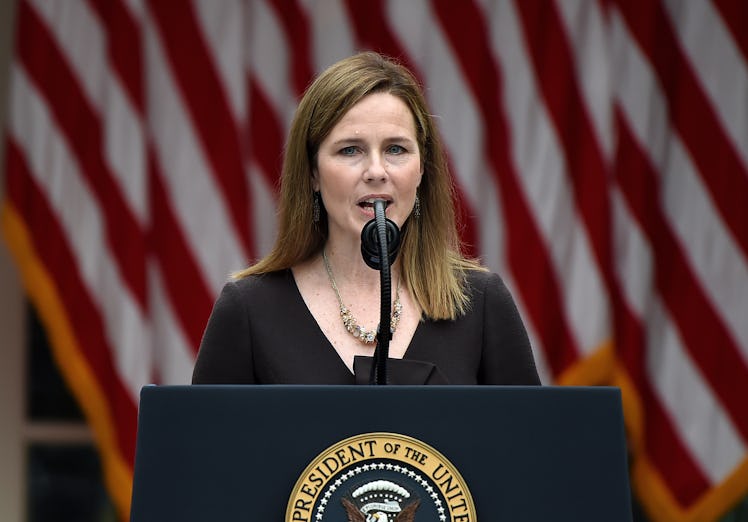
Amy Coney Barrett Referenced RBG & Her Supreme Court Mentor At Her Nomination
One week after Ruth Bader Ginsburg's death on Sept. 18, 2020, President Donald Trump announced his pick to fill the late justice's Supreme Court seat during a live-stream. As widely predicted by political analysts, Trump selected conservative judge Amy Coney Barrett as his choice for the next Supreme Court justice. After an introduction from Trump, Barrett laid out her thoughts on the position in a brief speech, in which she mentioned both her Supreme Court predecessor (if she's confirmed) and her Supreme Court mentor, and their unlikely friendship. Amy Coney Barrett's quote about Ruth Bader Ginsburg and Antonin Scalia during her nomination announcement promised she would remain nonpartisan if confirmed as a justice.
At the beginning of her speech, Barrett commemorated Ginsburg, who had served on the Supreme Court since 1993 up until her death on Sept. 18, 2020. In her nearly 30 years of serving on the highest court in the land, Ginsburg emerged as a feminist icon for her ardent defense of laws on gender equality and women's rights. Barrett praised Ginsburg for the profound impact she had on women everywhere.
"Justice Ginsburg began her career in a time when women were not welcome in the legal profession. But she not only broke glass ceilings; she smashed them," Barrett said. "For that, she has won the admiration of women across the country and indeed all over the world. She was a woman of enormous talent and consequence, and her life of public service serves as an example to us all."
Barrett went on to describe what most resonated with her about Ginsburg's time in the Supreme Court: her unlikely friendship with conservative justice Antonin Scalia. While the two late justices had polar opposite ideologies and argued often on the bench, they also maintained a years-long friendship and mutual respect.
"Particularly poignant to me was her long and deep friendship with Justice Antonin Scalia, my own mentor," Barrett said, referencing her time as a clerk for Scalia in the late '90s. "Justices Ginsburg and Scalia disagreed fiercely in print, without rancor in person. Their ability to maintain a warm and rich friendship despite their differences even inspired an opera. These two great Americans demonstrated that arguments, even about matters of great consequence, need not destroy affection. In both my personal and professional relationships, I strive to meet that standard."
Scalia's mentorship served as a huge inspiration for Barrett's own judicial approach. She said she shares Scalia's belief that judges must remain as objective and nonpartisan as possible.
"I clerked for Justice Scalia more than twenty years ago, but the lessons I learned still resonate," Barrett said. "His judicial philosophy is mine, too: A judge must apply the law as written. Judges are not policy-makers, and they must be resolute in setting aside any policy views they might hold."
It's clear Barrett was greatly inspired not only by her longtime mentor, Scalia, but also by his surprising friendship with Ginsburg. However, when it comes to rulings, she follows more in Scalia's footsteps than Ginsburg's. Barrett, who currently sits on the U.S. 7th Circuit Court of Appeals, has what The New York Times characterized as an "almost uniformly conservative" record on major political issues including abortion, gun policy, and immigration. Liberal activists and advocates are particularly concerned that she would threaten reproductive rights by weakening or overturning abortion rights case Roe v. Wade as part of a conservative-majority court.
Barrett is likely in for a fiercer confirmation fight than either Scalia or Ginsburg, who were both approved to their Supreme Court seats with more than 90% support in the Senate. Currently, Democrats and Republicans are fighting over whether Trump has the right to nominate a new justice with less than two months before a presidential election, four years after Republicans blocked the nomination of Merrick Garland to the court on the grounds that a president shouldn't nominate a new justice in an election year. The Senate is expected to begin holding hearings on Barrett's confirmation on Oct. 12, per the Associated Press.